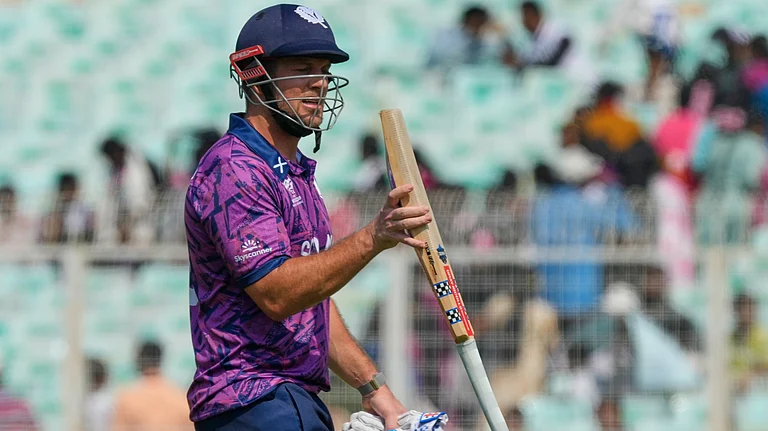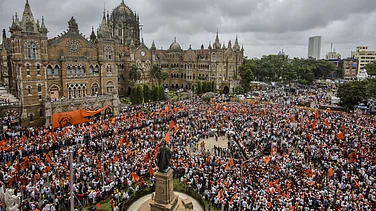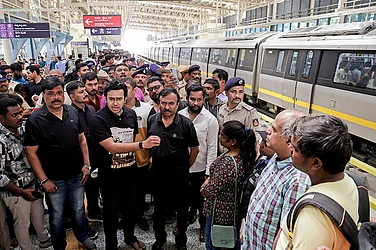Everest Is Not Such A Peak, After All
Some people spend a lifetime trying to climb Mt Everest. And then, there are those who have done it so many times that the difficult climb is ridiculously easy. Take Nepalese Kami Rita Sherpa. The 47-year-old has conquered the 8,848-metre peak a record 21 times. His latest conquest came as part of the recent Alpine Ascents Everest Expedition. His achievement has turned him into one of the three climbers in the world to have scaled the world’s highest peak for the maximum number of times. Earlier, Apa Sherpa and Phurba Tashi Sherpa had shared the honours for 21 successful expeditions. They now have another compatriot for company in the record books. Ever since Edmund Hillary and Tenzing Norgay first conquered Everest in 1953, thousands of people have made bids for the crowning glory in mountaineering, but few have been as successful as the local Sherpas.

Landing In A Lease Problem
Yoga guru Ramdev’s Patanjali Yogpeth Trust, often accused of being in the good books of the powers-that-be, recently had a rude shock in Himachal Pradesh when the state revenue officials pegged the revised lease amount, at Rs 12 crore, for a 96.02 bigha land at Kehlog village in the Kandaghat sub-division, as against the earlier amount of Rs 17.31 lakh. The amount is said to have been revised as per the new lease rules. The Congress has alleged that the land had been given to the trust at a throwaway price by the previous government. Ramdev’s trust has since moved the High Court. A representative of his trust termed the government move as unfair, saying the new rules have come into effect when Rs 14 crore had already been spent on the project, which had generated a lot of hopes for economic gains in the region.

Cagey In A Bullet-Proof Car
Politicos in general love all the security paraphernalia around them, but one of them has chosen to return a bullet-proof car provided to him by the Punjab government. Reason: he believes the car is in a rickety condition. The Amarinder Singh government recently deployed a bullet-proof Montero for Congress MP Ravneet Singh Bittu’s security, but he was not impressed. The grandson of slain former CM Beant Singh decided to return it, considered a status symbol, because it was in bad condition. The glasses on the windows of the 2006 model car were not moving and apparently gave Bittu a sense of being caged in. The security experts had a hard time explaining to him the need for keeping the vehicle along with his fleet of cars until a new, bullet-proof car was arranged for him.

Burial 600 Days After The Killing
It has taken more than 600 days for the bodies of eight activists, killed in police firing, to be buried in Manipur. Their bodies had been lying in the morgue ever since they were killed while protesting against the three “anti-tribal” Inner Line permit (ILP) Bills passed by the state assembly on August 31 last year. A memorial has also been constructed at Khuga in their honour. As per the agreement between the BJP-led coalition government and the tribal representatives of Churachandpur, the government has given Rs 5 lakh each to the families of the deceased, besides a government job, to end the deadlock. The preceding Congress government had claimed that the bills had nothing against the tribals, but the latter had taken to streets against the government move.

Salve For Hilsa And Mango Lovers
Teesta waters accord is not the only bone of contention between India and Bangladesh. West Bengal CM Mamata Bannerjee has other issues to contend with. She is said to be peeved at Dhaka’s decision to stop sending the famous Hilsa. Not only that, Bangladesh has also imposed a hefty tax—three-fold, to be precise—on the import of mangoes from Calcutta. This has come as a blow to the foodies on both sides. While Hilsa has been an old gastronomic delight, the juicy mangoes of rare varieties have held gourmets in Bangaladesh in thral for long. Mamata has now come to the rescue of all of them and is learnt to have requested PM Narendra Modi to solve this crucial matter at the earliest.
Balladur Involved In Karachi Affair?
A possible kickback during the sale of French submarines to Pakistan in 1995 has returned to bite former French president Edouard Balladur. He’s being probed for possible kickbacks from the sale to finance his presidential campaign. Described as the ‘Karachi affair’, judges are now trying to ascertain a series of links between middlemen and possible kickbacks over the Agosta submarine deal involving Balladur. Ex-president, Nikolas Sarkozy, who was budget minister at that time, is livid that his name is also being dragged through mud for being aware of the kickbacks.
Surprise Invite For Iftar
The hostility between Bangladesh’s two most powerful women, Khaleda Zia and Sheikh Hasina, is well-known. Mostly, they don’t talk to each other. Their respective supporters also bristle with mutual animosity. Earlier in the week when Khaleda, chairperson of the Bangladesh Nationalist Party extended an invitation to PM Hasina, president of the ruling Awami League to attend her iftar party, it predictably raised a few eyebrows. Many wonder whether the bonhomie would last beyond the iftar party and create a conducive atmosphere, which would allow space for dissenting voices to be expressed without fear of persecution.

A Bar For Pakistanis
Pakistan may not have been officially included in the list of Muslim “visa ban” countries of President Donald Trump yet. But there has already been more than 40 per cent decline in the number of US visas issued to Pakistanis since the new US administration took over.
An analysis of official figures released recently shows that non-immigrant visas given to Pakistanis in March and April this year marks a drop of over 40 per cent when compared with figures of the same period last year.
According to a report in Pakistani daily The News, the US state department data showed that Pakistan was issued 3,925 non-immigrant visas in April and 3,975 visas in March this year under the Trump administration. But under the Obama regime Pakistanis were given 78,637 non-immigrant visas during the same period with a monthly average of 6,553 visas. But this year there has been a drop of over 40 per cent in the number of visas to Pakistanis.
Interestingly, the number of non-immigrant visas issued to Indians in the same period has gone up by 28 per cent. The state department data shows that Indians were given 87,049 visas in April and 97,925 visas in March this year.
The analysis shows that Pakistan is not the only Muslim country whose nationals have been affected by the Trump administration’s policy. Data from more than 50 Muslim majority countries shows that number of visas issued to their nationals has also declined by nearly 20 per cent, in comparision to number of visas issued to them last year.
Soon after coming to power, President Trump imposed a travel ban to the US from six Muslim dominated countries—Iran, Syria, Somalia, Sudan, Libya and Yemen. Despite speculations that Pakistan too will be included in that list, it was never brought under that ban.
Significantly, however, the Trump presidency has not been able to get its travel ban past the American legal system, where on two occasions it was challenged and struck down as anti-constitutional.
But the attempted ban reflects President Trump’s ambiguity towards the Muslim world and the US’s traditional allies in West Asia and North Africa. He recently completed an official tour of the region and addressed the US-Arab Muslim Summit, asking for a stress on cooperation between the two sides. But countries like Pakistan, which had expected to be singled out for being frontline states in the fight against global terrorism, were completely ignored by the American president.
Illustrations by Sajith Kumar


























